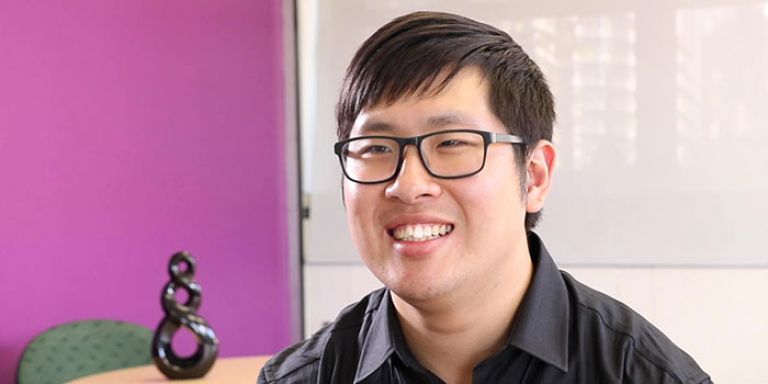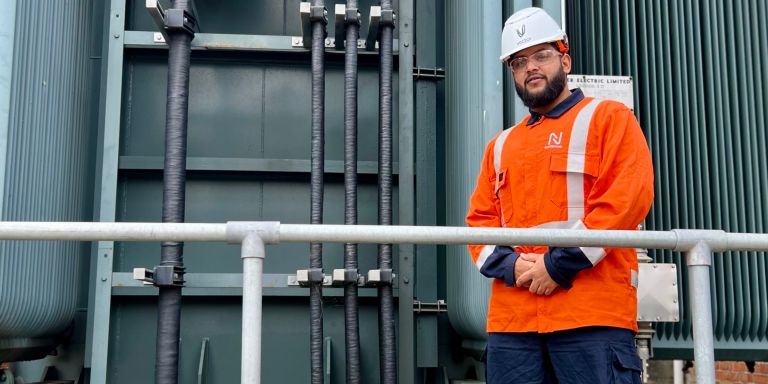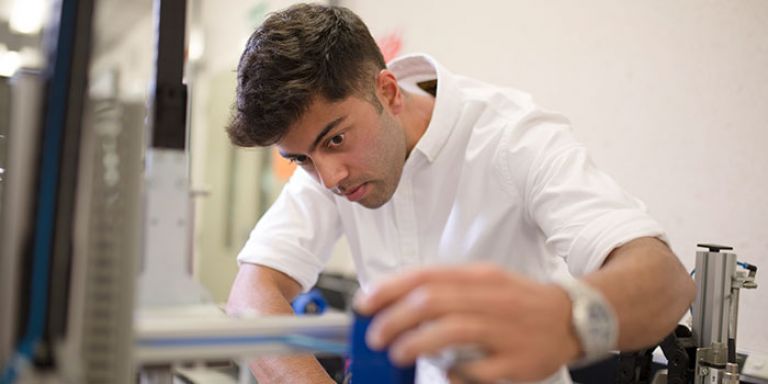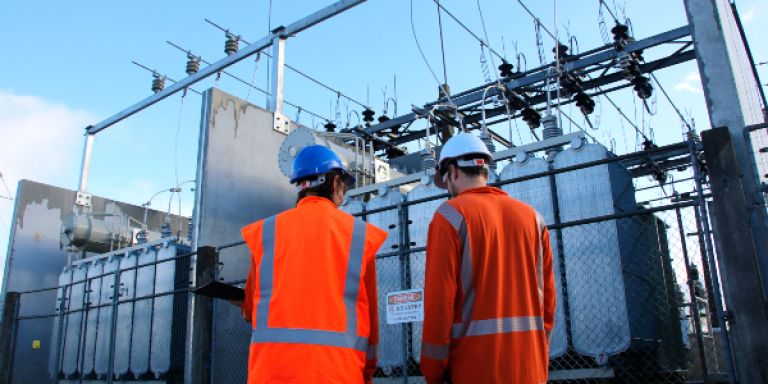Duration and study methods
Start dates
Qualification
Credits
Location
Domestic fees
International fees
NZD $29,200 (approx) per 120 credits
Free* study
Programme highlights
Get ahead in your career with practical skills in electrical engineering.
This qualification is for engineering graduates and experienced engineers looking to broaden their skill set.
You’ll graduate at the same level as a degree student.
Entry requirements
Academic
A 3-year bachelor’s degree in an Electrical or Electronic engineering discipline;
Or
Equivalent practical, professional or educational experience of an appropriate kind;
Or
Special entry may be granted by the Head of School responsible for the programme to an applicant who does not meet all entry criteria, where the Head of School is satisfied the applicant is capable of undertaking the programme of study.
English language entry requirements
Applicants must have sufficient competence in the English language to undertake this programme, which is taught and assessed in English.
Any applicant whose first language is not English may be required to provide evidence of their English language competency.
International students: English language entry requirements
For the minimum English language requirements refer to the requirements set out in the NZQF Programme and Accreditation Rules.
Other entry requirements
Applicants must be physically capable of completing the practical aspects of the programme, by being able to work effectively, efficiently and safely.
Give yourself credit with Recognition of Prior Learning (RPL)
Did you know you can use the knowledge and experience you already have to your advantage?
Your previous work experience and on-the-job skills, volunteering, professional development, and other providers’ qualifications can be recognised as prior learning, matched against credits in our courses, and put towards your qualification – potentially saving you money and possibly helping you to complete your qualification faster Learn more.
Programme structure
You will need to complete the below courses from the power strand (120 credits), including at least 75 credits at level 7:
Power
Compulsory courses
Level 6
533.624 Sustainable Energy and Power Electronics (15 credits)
Metro Group course code: MG6118
The aim is to develop an understanding of the concepts and applications of power electronics including basic converter types and applications involving small scale renewable energy systems.
The learning outcomes on successful completion of this course are the student should be able to:
- Describe power switching devices.
- Describe power conversion systems.
- Demonstrate knowledge of AC to DC conversion.
- Demonstrate knowledge of DC to AC and DC to DC conversion.
- Demonstrate knowledge of AC to AC conversion.
- Describe knowledge of Power Control Applications.
- Demonstrate knowledge of small to medium scale renewable energy systems covering up to 100kW.
Level 7
115.719 Engineering Development Project (30 credits)
Metro Group course code: MG7101
*This is a year-long course
The aim is to enable students to investigate an engineering problem; to propose, specify, design and develop a solution and where feasible, to construct and test a prototype.
The learning outcomes on successful completion of this course are the student should be able to:
- Synthesise a solution for an engineering problem.
- Complete a project to a specified standard.
- Design, project manage and evaluate a concept/model/product.
- Use software application packages as an engineering tool, if required.
- Communicate effectively with customers, peers, technicians and engineers.
523.703 Electrical Machine Dynamics (15 credits)
Metro Group course code: MG7011
The aim is to enable students to gain an understanding of AC electrical machine dynamics and control and power transformers. .
The learning outcomes on successful completion of this course are the student should be able to:
- Apply transformer theory to three-phase power transformers.
- Analyse fault currents in a power transformer and failure modes of power transformers and basic differential protection.
- Evaluate the theory of machine dynamics to induction motor starting, speed control, braking, and protection.
- Interpret the parameters used in the selection of motors.
- Explain the operation of fractional horsepower motors.
- Compare recent developments in machine design, control, and their application.
525.706 Power Systems (15 credits)
Metro Group course code: MG7110
The aim is to enable students to gain an understanding of three-phase power generation and transmission systems with an emphasis on generation, transmission and distribution systems.
The learning outcomes on successful completion of this course are the student should be able to:
- Evaluate aspects of the New Zealand Power System.
- Evaluate the types of generation systems in use in New Zealand (large scale >1000kW – hydro, geothermal, thermal and co-generation)
- Evaluate key aspects of transmission and distribution systems MV and HV networks.
- Apply power transformers in an MV and HV environment.
- Apply earthing systems and switchgear to MV and HV networks.
- Develop and apply an SLD for a simple network.
Elective courses
Level 6
523.613 Engineering Project (15 Credits)
Metro Group course code: MG6136
The aim is to apply knowledge and problem-solving skills to plan and complete an engineering project relevant to the strand studied (mechanical, electrical or electronics) to accepted practice and standards from a given specification.
The learning outcomes on successful completion of this course are the student should be able to:
- Develop preliminary design(s), based on a given specification, for an engineering project relevant to their strand (mechanical, electrical, electronics).
- Develop a plan or design parameters considering functionality, safety, environmental, cultural and ethical issues.
- Undertake well-defined planning and produce as project output.
- Produce supporting documentation relevant to project output.
- Evaluate compliance of the project output against specification.
- Present findings to an audience in a professional manner.
115.618 Protection (15 credits)
Metro Group course code: MG6047
The aim is to enable the students to gain an understanding of electrical power system fault protection concepts for both MV & HV systems.
The learning outcomes on successful completion of this course are the student should be able to:
- Demonstrate and understand operating principles of CTs and VTs in terms of various connection types and industry practice.
- Demonstrate knowledge and understanding of protection concepts for generators, aerial conductors, power cables, transformers, busbars and motors.
- Demonstrate knowledge and understanding of the various fault types that occur in electrical power systems both LV, MV and HV.
- Describe operation and application of the different power system protection equipment types under common protection scenarios.
- Demonstrate awareness of safety considerations and safe working practices in relation to power protection equipment.
- Demonstrate knowledge and understanding of digital protection and control systems and basic substation design.
142.603 Mathematics Level 6 (15 Credits)
Metro Group course code: MG6190
The aim is to enable students to understand advanced calculus and develop the ability to formulate and solve models of complex engineering and scientific systems.
The learning outcomes on successful completion of this course are the student should be able to:
- Use and apply vectors, vector calculus and advanced calculus.
- Use and apply mathematical transforms including Fourier series and Laplace transforms.
- Use and apply probability and statistical techniques.
- Use and apply numerical methods.
527.612 PLC Programming 2 (15 credits)
Metro Group course code: MG6019
The aim is to develop an understanding of, and an advanced knowledge of PLC systems, applications, and programming methods.
The learning outcomes on successful completion of this course are the student should be able to:
- Apply advanced PLC programming techniques.
- Apply PID (Proportional, Integral, and Derivative) control.
- Apply data communication concepts to a range of fieldbus systems.
- Integrate commonly used sensors and Human Machine Interfaces (HMI) to a PLC.
527.613 Automation (15 credits)
Metro Group course code: MG6020
The aim is to enable the student to learn modern advanced automation systems and practice used in industry.
The learning outcomes on successful completion of this course are the student should be able to:
- Select, interface, program and operate typical industrial networks.
- Apply a SCADA/HMI software package.
- Analyse peer to peer communication between PLCs.
- Interpret and apply IEC 61131-3.
241.613 High Power Electric Motors for Transport (30 credits)
Metro Group course code: MG6052
*This is a year-long course
The aim is to introduce the concepts and design principles of high power to weight electric machines for future transport applications, ranging from electric ships over trucks to large-scale hybrid electric aircraft.
The learning outcomes on successful completion of this course are the student should be able to:
- Examine superconductor theory in a high power to weight electric machine.
- Analyse cryogenic system used in a high power to weight electric machine.
- Analyse and compare rotating electric machines used in high power to weight machine transport application.
- Analyse devices used in the control system of a high power to weight electric machine.
- Categorise electric drive topologies for use in high power motors for transport applications.
Level 7
115.720 Professional Engineering Practice (15 credits)
Metro Group course code: MG7121
The aim is to enable students to critically apply knowledge and understanding of professional practice for engineers, professional engineering roles and activities and their interactions with society and the environment.
The learning outcomes on successful completion of this course are the student should be able to:
- Appraise the professional role of engineers in society and industry.
- Evaluate and apply laws within the engineering practice area.
- Critique moral and ethical issues related to the environment in an engineering context.
- Critically explore issues relating to behavioural management in the practice of engineering.
- Critically apply knowledge of Māori cultural concepts and perspectives to those of the Crown and project management development.
341.755 Project Management (15 credits)
Metro Group course code: MG7025
The aim is to enable students to apply project management principles, concepts and techniques.
The learning outcomes on successful completion of this course are the student should be able to:
- Initiate, plan, execute, monitor, control, and close out an engineering project.
Do you want to study a single course, without enrolling into the full programme?
Courses within some of our programmes may be offered as an individual Certificate of Proficiency (COP). Programme entry requirements and course fees apply. For more information, please speak to our friendly Ask Me! team.
Career opportunities
Graduates of this qualification will be qualified Technology Engineers and will be able to gain employment in the power field. For potential salaries visit careers.govt.nz.
See why more people choose Electrical engineering at MIT

Study at MIT’s award-winning TechPark campus.

MIT TechPark is an award-winning centre of excellence for engineering and trades.
Having won a Learning Environments Australasia Award which recognises planning, design and construction of educational facilities throughout the region, our state-of-the-art campus is the home of our engineering and trades school. Coupling stunning architectural learning spaces with a myriad of high-tech facilities for our students, it’s easy to see why it’s been given such high praises.
Our TechPark building is situated on the corner of Lambie Drive and Manukau Station Road. It is across the road from the existing MIT Manukau campus, currently home to the schools of nursing, health and counselling, business, and digital technologies.

“The choice to study engineering definitely secures your future.”

“Looking back on my experience at MIT, I really enjoyed the learning style. I did the lectures online and only had to come into class for one week a semester to do the practical parts. Overall, the atmosphere and the way that classes were taught was really enjoyable, and not too restrictive either. It just feels comfortable.
The choice to study engineering at MIT definitely secures your future. It narrows down on the things employers are looking for, like answers to practical questions that you might face on the job. Those are the things that show you are competent to employers.
My five-year plan is to become a senior engineer. It is a lifelong learning process, even now that I have the job, there is still a lot to learn. It is a continuous process. You have to keep going to gain more knowledge.
Having a qualification is really important if you want to land that dream job.”
Oscar Lee
MIT graduate

“The lecturers will do their utmost to help you succeed.”

“My advice, just do it. The lecturers will do their utmost to help you succeed.
I’m just a kid from South Auckland who has always been portrayed as the guy with no future from everyone around me. I was even asked to drop out of high school as my teachers saw no academic hope in me but at the end of the day as long as you truly believe in yourself you can literally accomplish anything in this world. So, I highly recommend anyone who thinks they’re ‘too dumb’ to be an engineer to just go for it, cancel out the noise and put in the work, put in hours and I promise you, your success will speak for itself.
I’m now a Graduate Design Estimator responsible for electrical distribution design, estimating, tendering, and pricing for customer-initiated projects. My role involves developing electrical design and liaising with multiple internal and external stakeholders to ensure the design are feasible. The typical projects I am regularly involved with include supplying power at proposed new subdivisions, distribution network upgrades, downgrades and new capacity projects on Vectors Electrical Distribution network in Auckland.
I attended high school through to the end of year 12. At the start of year 13, I decided to leave school to study the Electrical Engineering Certificate (Level 3) at MIT. This helped me into the electrical industry which ultimately helped me secure an Electrical Engineering cadetship with Northpower – where I gained practical experience out on the field whilst completing my electrical engineering diploma, specialising in power. MIT was a great experience for me – both in the diploma I completed through the Northpower cadetship, as well as my certificate in electrical engineering.
The diverse culture makes MIT unique. No matter where you are from MIT makes you feel a part of the family. The lecturers go above and beyond to help you succeed. The knowledge they possess, and the industry experience is next to none. Carrying this real-life industry experience meant there was not a single query my lecturers did not have a solution for. With their help, relating the practical and theoretical side of the electrical industry was a lot easier than I initially expected. The practical assessments are almost like a real-life simulation of what’s really out there, and the lecturers are always available to give you extra help when you need it outside of tuition hours, which was really the bread and butter for me. They really want to see their students succeed and go out of their way to help make that happen. Performing university level maths and physics almost seemed impossible as I had no prior high school/calculus experience but MIT made the whole learning experience achievable with the tremendous amount of support I felt from them.
The MIT qualification gave me the much-needed knowledge and experience to get myself in the door and start my journey as an upcoming engineer. Relating the practical side with the theoretical was a breeze with the support I received from MIT. I still use my skills and knowledge from MIT on a daily basis to perform my daily work tasks. These aren’t just skills I’ve learnt to get a qualification but in fact skills I will use throughout my whole career.
I really want to set an example and inspire the upcoming generation and really show them that anything is possible. My ultimate goal is to be an experienced leader in the industry and head into more complex roles such as project management.
The electrical industry is a never-ending profession and the career progressions available to you are endless. The challenges you will face throughout your career will only help you grow as a person.”
Ashnil Datt
MIT graduate

“The future is looking really exciting.”

“My decision to study engineering has given me job security.”

“I chose to study engineering because I am fascinated by electricity. When I see large factories, I wonder how some of their processes are automated, I wanted to learn and have the knowledge to do that. So for me, MIT was the best fit. I learnt the practical skills needed to get a job when I graduated.
My decision to study engineering has given me job security, I am an automation control specialist and the skills that I learned at MIT directly transferred to my role.”
Shiraaz Yakub
MIT graduate

“We need more females in the industry.”

“I’m the first Māori female in my family to actually be doing engineering. I never thought of doing electricity when I was growing up, no one in my family is in the industry until now, so I’m sort of like the first of my family. My Mum is very proud when she sees me in my gear. She always comments to my sisters and my family “oh, she has such an awesome job”. I just love seeing how happy they are for me.
We gain so much knowledge while we’re on our course studying. We have a small class so we’re able to bounce off each other. I also love that in a small class I’m able to talk to my teacher one-on-one.
My long-term career goal is obviously to become an engineer. I reckon that’s an awesome opportunity.”
You can read Alyssa’s full story below:
Alyssa Paki
MIT graduate
See why more people choose Electrical engineering at MIT

Study at MIT’s award-winning TechPark campus.

MIT TechPark is an award-winning centre of excellence for engineering and trades.
Having won a Learning Environments Australasia Award which recognises planning, design and construction of educational facilities throughout the region, our state-of-the-art campus is the home of our engineering and trades school. Coupling stunning architectural learning spaces with a myriad of high-tech facilities for our students, it’s easy to see why it’s been given such high praises.
Our TechPark building is situated on the corner of Lambie Drive and Manukau Station Road. It is across the road from the existing MIT Manukau campus, currently home to the schools of nursing, health and counselling, business, and digital technologies.

“The choice to study engineering definitely secures your future.”

“Looking back on my experience at MIT, I really enjoyed the learning style. I did the lectures online and only had to come into class for one week a semester to do the practical parts. Overall, the atmosphere and the way that classes were taught was really enjoyable, and not too restrictive either. It just feels comfortable.
The choice to study engineering at MIT definitely secures your future. It narrows down on the things employers are looking for, like answers to practical questions that you might face on the job. Those are the things that show you are competent to employers.
My five-year plan is to become a senior engineer. It is a lifelong learning process, even now that I have the job, there is still a lot to learn. It is a continuous process. You have to keep going to gain more knowledge.
Having a qualification is really important if you want to land that dream job.”
Oscar Lee
MIT graduate

“The lecturers will do their utmost to help you succeed.”

“My advice, just do it. The lecturers will do their utmost to help you succeed.
I’m just a kid from South Auckland who has always been portrayed as the guy with no future from everyone around me. I was even asked to drop out of high school as my teachers saw no academic hope in me but at the end of the day as long as you truly believe in yourself you can literally accomplish anything in this world. So, I highly recommend anyone who thinks they’re ‘too dumb’ to be an engineer to just go for it, cancel out the noise and put in the work, put in hours and I promise you, your success will speak for itself.
I’m now a Graduate Design Estimator responsible for electrical distribution design, estimating, tendering, and pricing for customer-initiated projects. My role involves developing electrical design and liaising with multiple internal and external stakeholders to ensure the design are feasible. The typical projects I am regularly involved with include supplying power at proposed new subdivisions, distribution network upgrades, downgrades and new capacity projects on Vectors Electrical Distribution network in Auckland.
I attended high school through to the end of year 12. At the start of year 13, I decided to leave school to study the Electrical Engineering Certificate (Level 3) at MIT. This helped me into the electrical industry which ultimately helped me secure an Electrical Engineering cadetship with Northpower – where I gained practical experience out on the field whilst completing my electrical engineering diploma, specialising in power. MIT was a great experience for me – both in the diploma I completed through the Northpower cadetship, as well as my certificate in electrical engineering.
The diverse culture makes MIT unique. No matter where you are from MIT makes you feel a part of the family. The lecturers go above and beyond to help you succeed. The knowledge they possess, and the industry experience is next to none. Carrying this real-life industry experience meant there was not a single query my lecturers did not have a solution for. With their help, relating the practical and theoretical side of the electrical industry was a lot easier than I initially expected. The practical assessments are almost like a real-life simulation of what’s really out there, and the lecturers are always available to give you extra help when you need it outside of tuition hours, which was really the bread and butter for me. They really want to see their students succeed and go out of their way to help make that happen. Performing university level maths and physics almost seemed impossible as I had no prior high school/calculus experience but MIT made the whole learning experience achievable with the tremendous amount of support I felt from them.
The MIT qualification gave me the much-needed knowledge and experience to get myself in the door and start my journey as an upcoming engineer. Relating the practical side with the theoretical was a breeze with the support I received from MIT. I still use my skills and knowledge from MIT on a daily basis to perform my daily work tasks. These aren’t just skills I’ve learnt to get a qualification but in fact skills I will use throughout my whole career.
I really want to set an example and inspire the upcoming generation and really show them that anything is possible. My ultimate goal is to be an experienced leader in the industry and head into more complex roles such as project management.
The electrical industry is a never-ending profession and the career progressions available to you are endless. The challenges you will face throughout your career will only help you grow as a person.”
Ashnil Datt
MIT graduate

“The future is looking really exciting.”

“My decision to study engineering has given me job security.”

“I chose to study engineering because I am fascinated by electricity. When I see large factories, I wonder how some of their processes are automated, I wanted to learn and have the knowledge to do that. So for me, MIT was the best fit. I learnt the practical skills needed to get a job when I graduated.
My decision to study engineering has given me job security, I am an automation control specialist and the skills that I learned at MIT directly transferred to my role.”
Shiraaz Yakub
MIT graduate

“We need more females in the industry.”

“I’m the first Māori female in my family to actually be doing engineering. I never thought of doing electricity when I was growing up, no one in my family is in the industry until now, so I’m sort of like the first of my family. My Mum is very proud when she sees me in my gear. She always comments to my sisters and my family “oh, she has such an awesome job”. I just love seeing how happy they are for me.
We gain so much knowledge while we’re on our course studying. We have a small class so we’re able to bounce off each other. I also love that in a small class I’m able to talk to my teacher one-on-one.
My long-term career goal is obviously to become an engineer. I reckon that’s an awesome opportunity.”
You can read Alyssa’s full story below:
Alyssa Paki
MIT graduate






